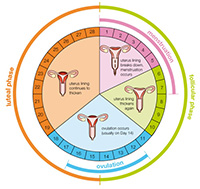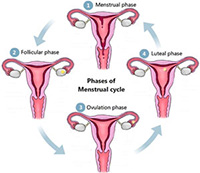Presentation
During a girl or women’s menstruation period, the uterine lining begins to separate from the uterine wall, because no egg has been fertilized. This separation causes bleeding that flows from the vagina. The bleeding marks the first day of a woman’s monthly cycle, which takes about 28 days. Some girls have a shorter period, others have a longer period. A girls’ period is unique and girls can have their first period between the age of 8-17.
During every cycle there are days where a girl can become pregnant during ovulation, these are called fertile days. This period is usually between 10 – 18 days after the start of a girls’ menstruation.




Contraceptives prevent from unwanted pregnancy or getting an STI. If sperm is ejaculated into a girl’s vagina during unsafe sex, then there’s a chance that the girl becomes pregnant.
There are a few signs to discover whether someone is pregnant;
• A missed period is the most obvious sign, but it doesn’t always mean a girl is pregnant. A lot of girls are late, have irregular menstruation or skip a month.
• Full and tender breasts
• Feeling nauseous
• Feeling very tired
The only way to be sure whether you’re pregnant is to get a test in the health center or to buy the test at the pharmacy.
Pregnancy is a wonderful experience, if you are ready for it! Unwanted pregnancy can cause a lot of problems for both the girl and the boy. Can you think of some?
Contraceptives prevent you from getting pregnant when you have sex. The safest methods for young people are the contraceptive pill, condoms (both female and male), the IUD and injections. None of these methods are permanent; when you stop using them, you are fertile again.
Female and male condoms are the only protection against both pregnancy and STI’s. The other methods only protect against pregnancy. It is a simple and natural method, which is easy to purchase in convenient stores or health centers.
The IUD (Intra-uterine device) is a small piece of copper placed inside the uterus by a professional health worker in a health center. It gives protection for up to 10 years, but is not very suitable for young girls.
A contraceptive injection: is an easy way for girls to protect themselves during 3 months against pregnancy. They are given in health centers. This method doesn’t prevent from STI’s.
Norplant implants: is another hormonal method and prevents ovulation in the girl and thus pregnancy. It has 2 small thin tubes inserted in the woman’s upper arm. The tubes slowly release hormone that prevents ovulation. Tubes can only be inserted by a trained health worker. Norplant lasts up to 6 years and gives excellent protection against pregnancy. Norplant does not protect against HIV/STIs.
Vasectomy and Tubal Ligation: vasectomy for the male and tubal ligation for the female provide permanent protection against pregnancy. These methods are only recommended for couples who already have children and don’t want more children. These methods are performed by a professional and it involves a minor surgery.
Being a parent is a lifetime responsibility. It takes two to make a baby, so both the boys and the girls are responsible. You have the choice to plan when you want children and how many you want.
Premature parenthood has a great impact on your life and is an enormous challenge. Sometimes you can go back to school or work but very often premature parents have to drop out or leave their job. Also, premature parenthood is a sensitive topic in society and not regarded as something positive. Therefore, you might find some challenges in finding support in society.
But if you do think you are ready for the task, then you should think about the following:
A parent has financial responsibilities for a child
Did you finish your education? Will you be able to go back to school once you’re a parent?
Think about your network. Where would you get support if something were wrong with your child?
©2024 All rights reserved




